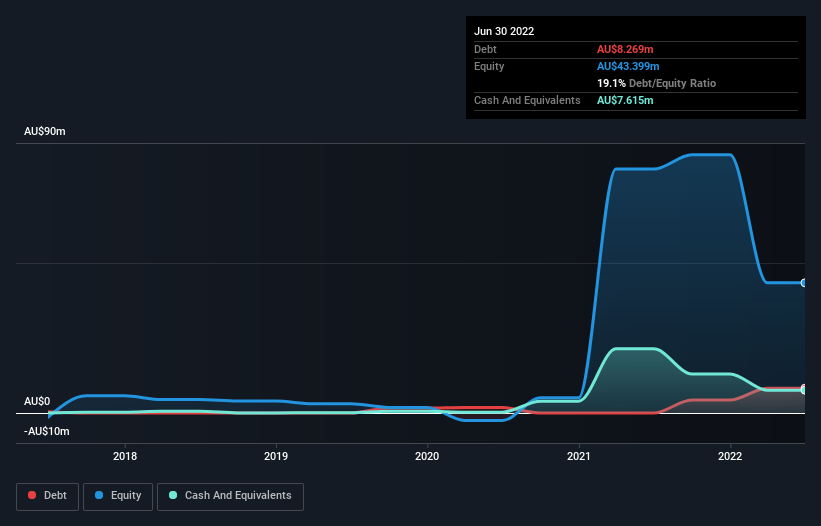Some say volatility, rather than debt, is the best way to think about risk as an investor, but Warren Buffett famously said that 'Volatility is far from synonymous with risk.' So it might be obvious that you need to consider debt, when you think about how risky any given stock is, because too much debt can sink a company. As with many other companies Spenda Limited (ASX:SPX) makes use of debt. But should shareholders be worried about its use of debt?
When Is Debt A Problem?
Generally speaking, debt only becomes a real problem when a company can't easily pay it off, either by raising capital or with its own cash flow. Ultimately, if the company can't fulfill its legal obligations to repay debt, shareholders could walk away with nothing. However, a more common (but still painful) scenario is that it has to raise new equity capital at a low price, thus permanently diluting shareholders. By replacing dilution, though, debt can be an extremely good tool for businesses that need capital to invest in growth at high rates of return. The first thing to do when considering how much debt a business uses is to look at its cash and debt together.
Our analysis indicates that SPX is potentially overvalued!
What Is Spenda's Debt?
The image below, which you can click on for greater detail, shows that at June 2022 Spenda had debt of AU$8.27m, up from none in one year. However, it also had AU$7.61m in cash, and so its net debt is AU$654.3k.

How Healthy Is Spenda's Balance Sheet?
We can see from the most recent balance sheet that Spenda had liabilities of AU$10.9m falling due within a year, and liabilities of AU$52.7k due beyond that. Offsetting these obligations, it had cash of AU$7.61m as well as receivables valued at AU$15.2m due within 12 months. So it actually has AU$11.8m more liquid assets than total liabilities.
This surplus strongly suggests that Spenda has a rock-solid balance sheet (and the debt is of no concern whatsoever). With this in mind one could posit that its balance sheet means the company is able to handle some adversity. There's no doubt that we learn most about debt from the balance sheet. But it is Spenda's earnings that will influence how the balance sheet holds up in the future. So when considering debt, it's definitely worth looking at the earnings trend. Click here for an interactive snapshot.
In the last year Spenda wasn't profitable at an EBIT level, but managed to grow its revenue by 156%, to AU$2.2m. So there's no doubt that shareholders are cheering for growth
Caveat Emptor
Over the last twelve months Spenda produced an earnings before interest and tax (EBIT) loss. Its EBIT loss was a whopping AU$15m. Looking on the brighter side, the business has adequate liquid assets, which give it time to grow and develop before its debt becomes a near-term issue. Still, we'd be more encouraged to study the business in depth if it already had some free cash flow. Having said that the rate of revenue growth will likely impress the market, greatly facilitating any potential capital raising, if required. Despite that strong positive, this one could still be considered a bit too risky, by some. There's no doubt that we learn most about debt from the balance sheet. However, not all investment risk resides within the balance sheet - far from it. To that end, you should learn about the 5 warning signs we've spotted with Spenda (including 2 which are a bit concerning) .
Of course, if you're the type of investor who prefers buying stocks without the burden of debt, then don't hesitate to discover our exclusive list of net cash growth stocks, today.
New: Manage All Your Stock Portfolios in One Place
We've created the ultimate portfolio companion for stock investors, and it's free.
• Connect an unlimited number of Portfolios and see your total in one currency
• Be alerted to new Warning Signs or Risks via email or mobile
• Track the Fair Value of your stocks
Have feedback on this article? Concerned about the content? Get in touch with us directly. Alternatively, email editorial-team (at) simplywallst.com.
This article by Simply Wall St is general in nature. We provide commentary based on historical data and analyst forecasts only using an unbiased methodology and our articles are not intended to be financial advice. It does not constitute a recommendation to buy or sell any stock, and does not take account of your objectives, or your financial situation. We aim to bring you long-term focused analysis driven by fundamental data. Note that our analysis may not factor in the latest price-sensitive company announcements or qualitative material. Simply Wall St has no position in any stocks mentioned.
About ASX:SPX
Spenda
Develops and commercializes technology assets that enable the modernization of business IT systems through conversion, migration, and management of server-based legacy data and systems to the cloud in Australia.
Flawless balance sheet and fair value.
Market Insights
Community Narratives


Recently Updated Narratives


MINISO's fair value is projected at 26.69 with an anticipated PE ratio shift of 20x


The Quiet Giant That Became AI’s Power Grid


Nova Ljubljanska Banka d.d will expect a 11.2% revenue boost driving future growth
Popular Narratives


The company that turned a verb into a global necessity and basically runs the modern internet, digital ads, smartphones, maps, and AI.


MicroVision will explode future revenue by 380.37% with a vision towards success



